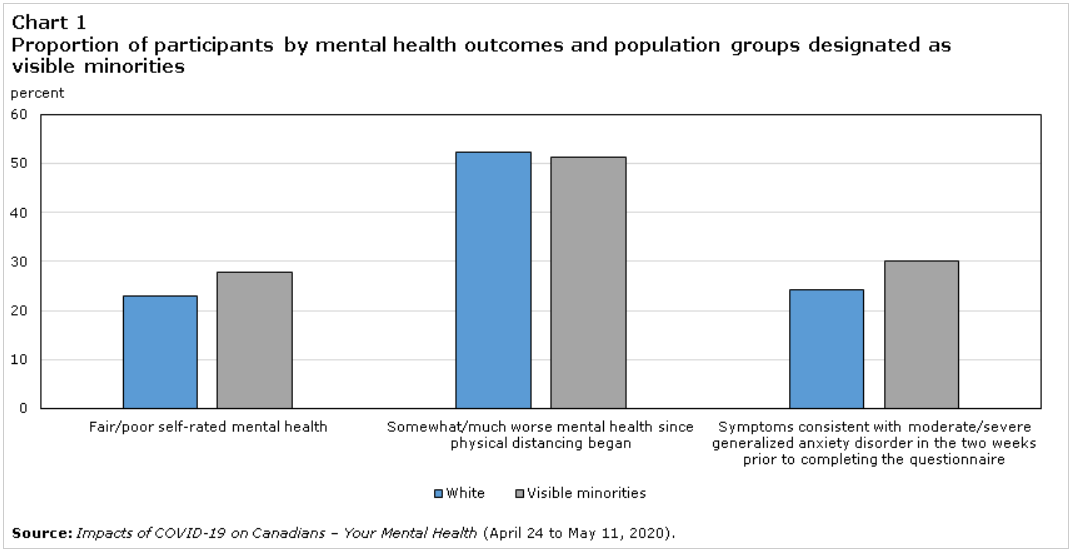Black people often lack access to mental health services. Stigma makes it even harder to get help.
The Black community has a long history of suffering from mental health challenges. This struggle is deeply linked to traumas including enslavement, racism, and segregation. The legacy of past centuries continues to impact people today.
In Canada, Black people have higher unemployment rates. Moreover, it is harder for them to find family physicians and access to mental health care.
This Black History Month, we’re highlighting barriers to mental wellness in Black communities.
What are the barriers to Black mental health care?
Systemic Inequity
Not everyone has equal access to mental health care. For example, many people cannot afford therapy and other mental health supports. In addition, low-income communities often have fewer mental health programs and services.[1]
The COVID-19 pandemic has made this inequity even more visible. According to Statistics Canada, visible minorities are experiencing worse mental well-being. Compared to white Canadians, visible minorities are also feeling more generalized anxiety. [2]

Lack of Professional Representation
When seeking professional support, it’s easier to connect with people who share a similar background. For example, a patient may be more comfortable with a doctor who can understand and relate to their lived experiences. Research shows that Black people would be more willing to speak to a professional if they were Black.[3] However, Black people are not always well represented in support professions. As a result, they also struggle to find support that they are comfortable with.
Misconceptions
Misconceptions play a big role in preventing people from accessing mental health care in the Black community. For example, a common belief is that mental health services are only for those who experience severe mental illnesses. In other words, people may feel that “this is not for me”. As a result, Black people experiencing depression, social anxiety and other diagnoses are less likely to seek help.
In addition, religious beliefs contribute to a lack of access to mental health care. For example, Black people often associate a lack of faith with those who seek professional help. Furthermore, they may believe that mental health problems will get better on their own. [4]
Mental Health Stigma in the Black Community
Mental health stigma remains a taboo in our society. The Black community, in particular, tends to avoid conversations about mental health. For instance, many people find it hard to talk about the issues they’re experiencing with their families and loved ones. In addition, those who seek support may be perceived by their community as lacking in faith. In short, stigma and the fear of judgement from the community may prevent Black people from getting support.
Although that is the case, a lot of progress has been made in recent years. People are sharing their experiences publicly and helping shine a light on mental illness. Our clients Andrew and Karlina are some of them, whose stories continue to inspire many in our communities.
Ways to Support Black Mental Health
Diverse and inclusive community mental health support programs can make a big difference for Black mental health. At LOFT, our programs offer a safe and welcoming environment for people from every race, religion, ethnicity, creed, sex, sexual orientation, gender identity and gender expression.
We are committed to operating from an anti-oppressive framework. We foster equity and inclusion by acknowledging how diverse identities intersect and contribute to unique marginalization experiences.
LOFT continues to implement staff recommendations for improvement. Recently, we developed an anti-racism policy and committee to learn and build on ways to support our staff and clients.
Community support programs are often free or offered at a cost geared to the individual’s income. They are focused on recovery and tailored to the needs of each person.
If you’re looking for support for yourself or someone you know, learn more about our services for youth, adults, and seniors. Access our mental health support services here.
[1]Mental Health Commission of Canada
[2]Statistics Canada
[3] FAMHAS Foundation. (2020). Black mental health: Let’s talk about it.
[4]Mental Health Commission of Canada
